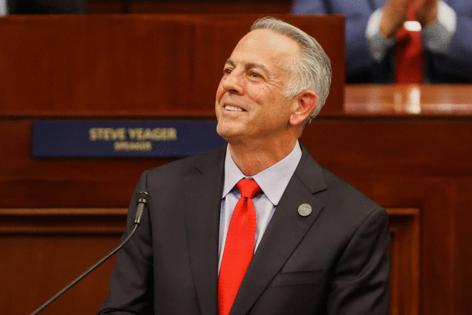Got water rights? Nevada wants to buy them but doesn't have the money
Published in News & Features
LAS VEGAS — The driest state in the nation will create a program to buy back water rights and permanently retire them, but questions remain about where the money for it will come from.
Gov. Joe Lombardo, a Republican, signed Assembly Bill 104 and Senate Bill 36 last week. The companion bills only create the voluntary groundwater rights retirement program, rather than taking it a step further to appropriate state funds for it.
“This program serves as an effective tool for retiring groundwater rights, particularly in regions where demand exceeds supply,” Josh Meny, a governor’s office spokesman, said in a statement on Monday. “The approach adopted is both thoughtful and balanced.”
The bipartisan success praised by conservationists and ranchers alike comes two years after a similar bill pushed by Sen. Pete Goicoechea, R-Eureka, failed to gain traction in the previous legislative session.
“The ‘buy back of water rights’ recognizes our changing and diversity of water needs,” Assemblymember Natha Anderson, D-Sparks, said in a statement on Saturday. “These companion bills show what can happen when people trust each other enough to ask questions, disagree and come to consensus on important legislation.”
Will a benefactor step up?
The need for such a program is clear as Nevada — and much of the country — faces an overpumping crisis.
According to science nonprofit The Nature Conservancy, more than half of Nevada’s 256 hydrological basins are considered “over-appropriated.” In other words, water users hold rights on paper to pump more water than the so-called “perennial yield,” or the total amount of water the state engineer deems is physically available in the ground each year.
In the West, the so-called prior appropriation doctrine makes it so that the right to pump water is first come, first served. That means multigenerational ranchers often have the most senior water rights, giving them priority in times of shortage.
But last month, Nevada’s financial shortcomings were on full display, with state legislators learning of a $191 million shortfall over the next two years, leaving little to no wiggle room for new budget appropriations.
The law creates a state account solely for the purpose of purchasing and retiring water rights, and permits the collection of private and public donations. Meny, Lombardo’s spokesman, pointed to future legislative appropriations, federal grants and public-private partnerships as potential sources of funding.
“Its success is contingent upon the availability of future legislative funding and grants,” Meny said.
Kyle Roerink, executive director of the nonprofit Great Basin Water Network, has long said a groundwater rights retirement program will work only if it can find a sustainable funding source.
“With this framework in place, we must now find funds to fill its coffers,” Roerink said in a statement on Saturday. “Governor Lombardo’s signature sends a signal that this program is worth the investment for stabilizing groundwater systems throughout the state.”
Pilot program’s success
While funding may prove a challenge, a pilot program underscored rural Nevada’s immense interest in selling off water rights to the state in the name of conservation.
It helped the state engineer’s only “critical management area,” known as Diamond Valley, a small ranching community in Eureka County. So many water rights were retired, using American Rescue Plan Act funds, that pumping may be reduced by a third of the perennial yield of the basin, or the yearly amount of water that is usable.
Jake Tibbitts, the natural resources manager for Eureka County, said in a statement on Saturday that the accomplishment is proof of the potential of a statewide program.
“Through the strong interest and success of the groundwater retirement pilot project, I’ve seen firsthand how effective this tool can be in tackling the very issues these bills aim to solve,” Tibbitts said. “Groundwater rights retirement offers a practical and more consensus-based path to managing water sustainably, without relying on conflict or litigation.”
_____
©2025 Las Vegas Review-Journal. Visit reviewjournal.com.. Distributed by Tribune Content Agency, LLC.







Comments